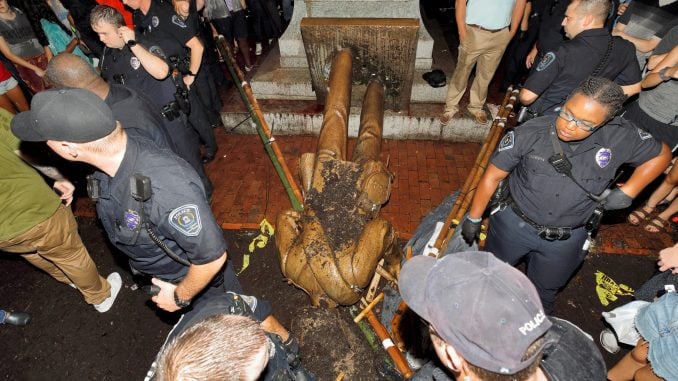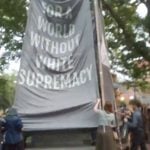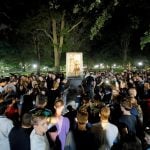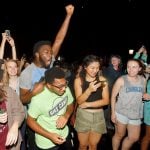
CHAPEL HILL, N.C. — UNC Chapel Hill is launching a criminal probe after protesters toppled a statue of a Confederate soldier on its campus Monday night, the latest move to dismantle Civil War symbols amid debate about race and the legacy of slavery in the United States.
About 250 demonstrators gathered on Monday evening ahead of Tuesday’s first day of fall classes for a protest and march at the base of Silent Sam. The now controversial statue on the Chapel Hill campus was a gift from the United Daughters of the Confederacy and erected on campus in 1913. The statue is dedicated to the alumni of the University who were killed during the Civil War. Protesters chanted and cheered as they pulled the statue down with rope, kicking it as it lay face down and throwing mud and dirt on it.
“That’s right, bury this mother f****** enslaver!” one protester shouted, while the crowd chanted, “people power,” “black power” and “queer power.”
The university system’s board chair, Harry Smith, and president, Margaret Spellings, said on Tuesday campus police had launched a criminal investigation into the incident, which they described as “mob rule.”
“Campus leadership is in collaboration with campus police, who are pulling together a timeline of the events, reviewing video evidence, and conducting interviews that will inform a full criminal investigation,” Smith and Spellings said in a statement.
Senate and House leadership also weighed in.
“Many of the wounds of racial injustice that still exist in our state and country were created by violent mobs and I can say with certainty that violent mobs won’t heal those wounds. Only a civil society that adheres to the rule of law can heal those wounds and politicians from the Governor to the District Attorney must start that process by ending the deceitful mischaracterization of violent riots as ‘rallies’,” said Sen Pro Temp Phil Berger (R-Rockingham)
North Carolina Gov. Roy Cooper, a Democrat, said in a statement he shared protesters “frustration” over statues but condemned the violent destruction of public property. Campus police arrested at least one person at the protest for masking their face and resisting arrest, according to Audrey Smith, a university spokeswoman.
In 2015, the N.C. General Assembly approved a law that prevents removal of Confederate monuments on government property without legislative approval. The measure puts the decision to move any statues with the N.C. Historical Commission and says relocated statues must go to a location of equal prominence.
The efforts by civil rights groups and others to do away with Confederate monuments such as Silent Sam gained momentum three years ago after avowed white supremacist Dylann Roof murdered nine worshippers at a black church in Charleston, South Carolina. The shooting rampage ultimately led to the removal of a Confederate flag from the statehouse in Columbia.
Since then, more than 110 symbols of the Confederacy have been removed across the nation with more than 1,700 still standing, according to the Southern Poverty Law Center, a civil rights group. Many of the monuments were erected in the early 20th century, decades after the Civil War’s end. Many Americans see such statues as symbols of racism and Southern states’ defense of slavery in the Civil War. Others view them as important symbols of American history.
In a message from the National Chapter of the United Daughters of the Confederacy, leaders said:
“We are saddened that some people find anything connected with the Confederacy to be offensive. Our Confederate ancestors were and are Americans. We as an Organization do not sit in judgment of them nor do we impose the standards of the 21st century on these Americans of the 19th century.
It is our sincere wish that our great nation and its citizens will continue to let its fellow Americans, the descendants of Confederate soldiers, honor the memory of their ancestors. Indeed, we urge all Americans to honor their ancestors’ contributions to our country as well. This diversity is what makes our nation stronger.”
In a March meeting of the North Carolina Historical Commission, North Carolina military veterans turned out in force to call for the protection of Confederate monuments in the state, saying that washing public areas of history is an affront to any service member who fought and was injured or died in battle.
“As a North Carolinian, a Tarheel, a Confederate descendant, those monuments mean everything to me,” Gary Williamson of Snowcamp said at that spring public meeting. “As far as I’m concerned, and I think I speak for a lot of folks here, if it does further the agenda of Gov. Cooper and we have to fight these battles, we will fight until Hell freezes over — and then we’ll fight on ice.”
The North Carolina Historical Commission had already scheduled a meeting for Wednesday at 10 a.m. of its Confederate Monuments Study Committee. During the meeting the committee is scheduled to discuss a petition from the Cooper administration to relocate three Confederate monuments from the State Capitol grounds in Raleigh to the Bentonville Battlefield State Historic Site in Four Oaks, N.C.
After the Confederate Monuments Study Committee meets, the full N.C. Historical Commission will gather at 10:30 to consider the recommendation. The full commission had received petitions from activists to also consider relocating Silent Sam but said it had not received such a request from the UNC system.
The committee meetings are open to the public and will be held in the first-floor auditorium of the Archives and History/State Library Building with doors opening at 9 a.m.





